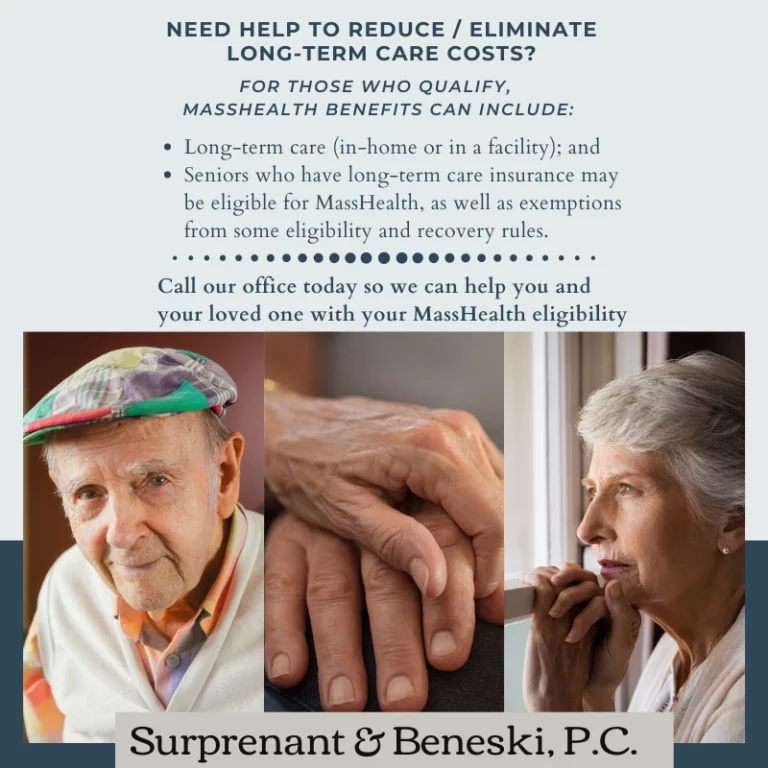Need help to reduce / eliminate long-term care costs?
For those who qualify, Medicaid (MassHealth) benefits can include:
- Long-term care (in-home or in a facility); and
- Seniors who have long-term care insurance may be eligible for MassHealth, as well as exemptions from some eligibility and recovery rules.
Before you consider how MassHealth may be able to help off-set your long-term care expenses, let’s look at some common misconceptions:
- “Only Wealthy People Can Afford Long-Term Care”
Often, we think of long-term care as nursing home care. But long-term care is actually a variety of services including in-home care helping with activities of daily living (commonly referred to as ADLs). The six ADLs are bathing, dressing, toileting, transferring (go to and from a bed/chair), eating, and continence.
The median national rate for a private room in a nursing home in the U.S. is $102,200 each year according to the Genworth Cost of Care Survey 2019. The responsibility for payment of long-term care rests with the individual needing care.
Some people use their own income and assets to pay the costs, while others purchase long-term care insurance to defray the costs of long-term care. Many individuals may qualify for Medicaid (MassHealth) to help pay for the care provided in these settings.
- “Medicare will Pay for Long-Term Care”
Medicare pays for skilled care in a nursing home only for short periods (up to 100 days). In Massachusetts the Medicaid program, called MassHealth, provides coverage for a nursing home if an individual meets financial and other qualifying criteria. Properly preparing to qualify for these benefits is a complex process. Seeking the guidance and support of an experienced Elder Law Firm can help avoid excessive costs and/or mistakes.
- “It’s too Late. We Never Protected Our Assets Including the Family Home”
Never say never. It’s almost never too late–people oftentimes don’t realize that there are ways to shelter their home and savings from the cost of nursing homes and other long-term care, even at the last minute. There are absolutely options. Those options depend heavily on your individual circumstances. To that end, it is advised to seek the guidance of an experienced Elder Law Firm to help strategize a plan.
- “I can just Transfer My Home to My Adult Children to Protect It”
We strongly advise against this! Why? Think of the possible scenarios:
- What happens if your adult child, because of a car accident, is sued or needs to file bankruptcy? A lien could be filed against your home and possibly lose it.
- What if your adult child gets divorced from their spouse and their assets have to be split between them according to the court?
No matter how responsible your children are, many unforeseen scenarios exist. A better way to protect your home is through a trust.
- “The Look-Back Period for MassHealth Eligibility Period is X years”
“Is it 7 years? My neighbor told me it was.” No, it is 5 years but those five years are critical. Everything you have done for the last five years, financially speaking, is examined. Gifting sums of money is always a problem. People think that gifting $15,000 is allowed because it is allowed by the IRS with no gift tax implications. But Medicaid and the IRS are two entirely separate entities. Mass health has very specific amounts and anything over that amount will disqualify you from receiving benefits.
Of course, the best approach is proactive planning, significantly more than half of the assets can be protected, so it is always advisable to consult with an experienced Elder Law attorney sooner than later. But if that ship has sailed, an Elder Law attorney should still be able to help. Misinformation can cost you and your family so much time and money. Our attorneys can provide you with the guidance to minimize the angst and cost associated with obtaining MassHealth eligibility.
Call our office today to schedule your consultation.
©Surprenant & Beneski, P.C. 35 Arnold Street, New Bedford, MA 02740, 336 South Street, Hyannis MA 02601 and 45 Bristol Drive, Easton MA 02375. This article is for illustration purposes only. This handout does not constitute legal advice. There is no attorney/client relationship created with Surprenant & Beneski, P.C. by this article. DO NOT make decisions based upon information in this handout. Every family is unique and legal advice can only be given after an individual consultation with an elder law attorney. Any decisions made without proper legal advice may cause significant legal and financial problems.
